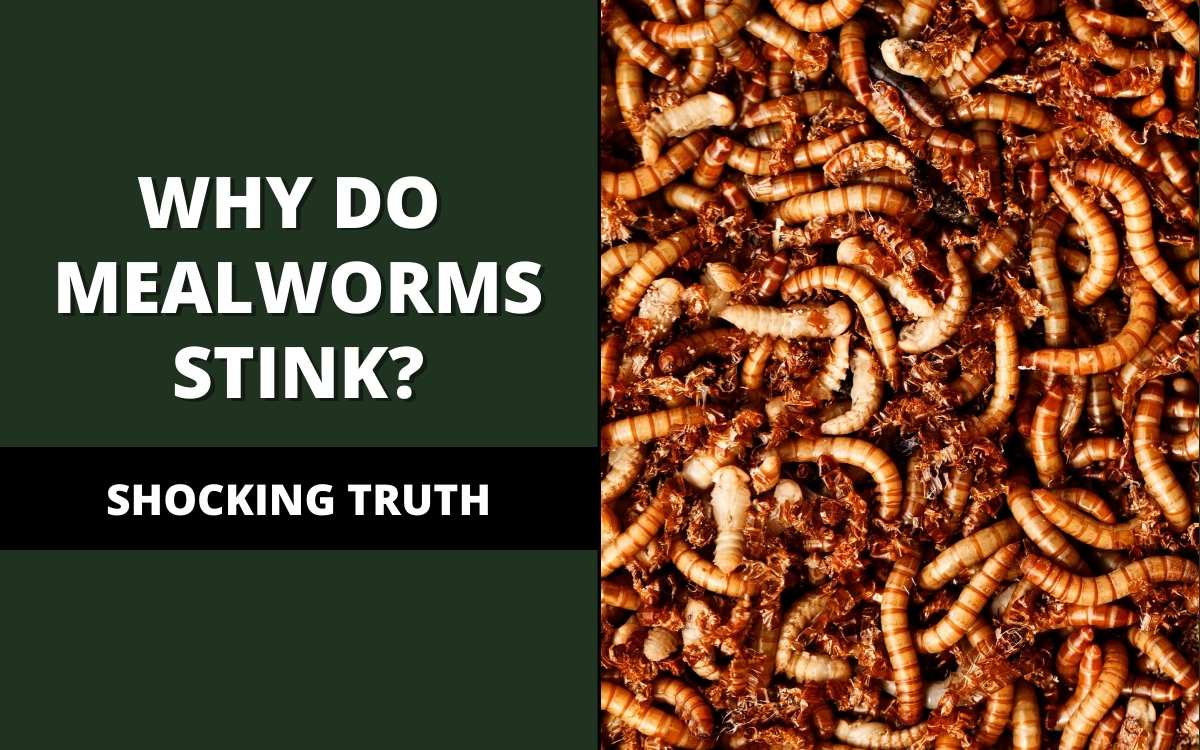Disclaimer: As an Amazon Associate I earn from qualifying purchases. Therefore, we may collect a share of sales from the links on this page, at no extra cost to you!

Why do mealworms stink? The fact that you are asking this question means you either have a colony of mealworms in your home or you are planning on getting them soon.
Mealworms are worm-like larvae found in the second stage of the life cycle of Tenebrio molitor, a beetle species of the Tenebrionidae family.
They can be an excellent addition to your pet reptile’s diet due to their high nutritional value.
Bearded dragons, Leopard geckos, chameleons, and other reptile species find Mealworms quite delicious because they contain large amounts of protein and fat.
Nonetheless, mealworms should only be fed to adult reptiles since they can cause impaction in juveniles. Needless to say, impaction may require hospitilzation and the use of antibiotics to treat your reptile.
In as much as Mealworms have a high nutritional value, keeping them can be a bit challenging, especially if it is your first time.
When it comes to mealworms, the goal is to keep them in the larval stage for as long as possible since most reptiles don’t like them after they have morphed to the pupal stage.
Before we proceed, however, let’s answer the question forming the topic of our discussion:
Jump to..
Why Do Mealworms Stink?
Mealworms don’t stink. The bad odor coming from the colony is brought about by decaying dead bodies and frass lying around in the container in which the mealworms are being kept. As such, the colony will only stink if the worms are not given proper care.
Besides feeding the Mealworms the right type of food, ensure that the environment they are in is conducive as this will prevent them from dying.
Additionally, Mealworms should be provided with just the right amount of water. Too much water may cause the substrate to undergo fermentation, resulting in the formation of repelling odor.
On the other hand, little or no water may kill the larvae, so ensure that you do everything right to avoid unnecessary complications.
How to Keep Live Mealworms without Them Stinking
If you are keeping a Bearded dragon, Leopard gecko, or any other reptile that can eat Mealworms, you should only go for live mealies.
Live Mealworms are not only more nutritious but are also easy to digest compared to dried mealies. Moreover, freeze-dried Mealworms may cause impaction in some reptiles due to the food’s low moisture content.
You can only have access to live Mealworms by culturing the larvae in your home. As stated earlier, this may not be easy because there are several things that you will be required to do to prevent the Mealworm colony from stinking.
Below are some of the things that can help you keep your Mealworm colony odor-free:
1. Keep The Mealworms Refrigerated
Mealworms require warm temperatures of between 70°F and 80 °F for them to thrive and transform into pupa.
Under these conditions, they consume a lot of food, meaning they will excrete more frass.
Thus, leading to the accumulation of excrements in the container. This will, in turn, cause the colony to stink.
To prevent this from happening, you should consider keeping the Mealworms in a refrigerator for up to 2 weeks.
Ensure that you keep the temperature between 45°F and 50°F as this will keep the mealies dormant for a while.
And because Mealworms don’t eat when they are kept in low-temperature conditions, you won’t have to worry about frass.
Refrigeration also stops the process of metamorphosis temporarily in Mealworms so the larvae won’t transform into a pupa.
Once the two weeks elapse, the worms should be taken out of the refrigerator, and kept at room temperature for up to 24 hours. After this, supply the mealies with food and water.
Note: The Mealworms must be gut-loaded before they are put in the refrigerator.
2. Change The Substrate
Most Mealworm substrates are made of seeds and ground-up grains, both of which are likely to ferment after some time.
Since the frass is also in the substrate, applying a fresh layer of substrate will prevent the Mealworm colony from stinking. You can as well clean the container.
3. Remove The Dead Mealworms
Mealworms that are in captivity can die due to several reasons. In most cases, however, they die due to unfavorable conditions in their environment.
Ensure that you remove the dead mealies from the container before they start decaying. This should be every week for hygienic purposes.
Final Verdict
Mealworms, in a very real sense, don’t stink. Nonetheless, the colony may produce a bad odor if you don’t take care of the larvae properly.
Decaying dead bodies and frass should be removed from the container regularly before they start to stink.
